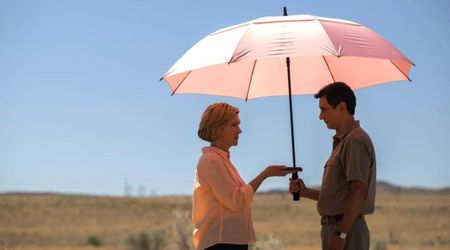The Hidden Angle | 'The Plot Against America' and its portrayal on how fascism re-emerging traumatizes kids

'The Plot Against America' is just one episode away from ending and we wait with bated breath to see how Charles Lindbergh wreaks havoc in the lives of Herman Levin's (Morgan Spector) family with his fascist rule that is blindly supported by Rabbi Lionel (John Turturro) and his wife Evelyn Finkel (Winona Ryder), who also happens to be Herman's sister-in-law. Herman's wife Bess (Zoe Kazan) had been worried since the beginning about how the US is not their country anymore and that the best solution was to leave the country and move to Canada. However, Herman had stayed put and by doing so, not only did his eldest son Sandy Levin (Caleb Malis) get tempted to join the dark side but his younger son, Philip Levin (Azhy Robertson) ended up being inflicted with harsh trauma as well.
The show centers on Herman's struggle to get his family to understand why it is important to stay and fight for what they believe in versus covering in fear, but what it also successfully captures is how children's psyches are affected when they are brought up in an environment where there is no stability but only talk of oppression, war, and death. While Herman's intentions are not to scare Philip away, that is exactly what he ends up doing by taking him often to the theaters to watch newsreels of how Hitler is killing hundreds of thousands of people in Europe.

Philip is still a child whose only interest has been in collecting stamps, but after watching one newsreel about an entire town being wiped away by bombs and overhearing his father speak about how Charles Lindberg being elected to govern America would mean that the same fate awaited them; Philip begins to have nightmares. His mother Bess notices how he has ended up having nightmares too often and takes him to a psychiatrist who tells her that this has become the norm about young Jewish boys, especially since news of Lindbergh being elected had begun circulating.
After Lindbergh does get elected, Philip's mental state gets further affected and things quickly go out of hand. He begins to plan his getaway and he begins by packing a bag with necessities in case his family gets bombed. Nevermind that he is in New Jersey and not in Europe where the war is currently happening, but Philip cannot reason at this point and he is just projecting all the hateful things that his father had so far said about Lindbergh in his presence. Not that Lindbergh doesn't deserve it, but Herman's need to keep his sons informed of their legacy, of the suffering of their ancestors, who neither Sandy nor Philip know or care about, ends up affecting both his sons in a different manner.

Sandy becomes his aunt Evelyn and her fiance turned husband's mouthpiece and tries to reason with his father about how Lindbergh is not bad. He also tries to get his father to understand that not all new things have to be scary and anti-jewish. Of course, he doesn't grasp the magnitude of what it means for his family to continue to be in a city where a fascist government rules. Philips, on the other hand, despite being young seems to understand and know things that would disturb the peace in his family and bring about discord.
For instance, when he meets Alvin after his cousin returns from Canada because he lost his leg in the war against Nazis, he is a lot more sensitive to Alvin's condition than Sandy. This comes as a surprise honestly because until Alvin had left to Canada, Sandy had idolized his cousin and had taken his side whenever his father had tried to put a stop to Alvin's unruly ruffian ways.
When his family gets chosen to be a part of the Homestead project, Philips also understands that this move is not that good an option for them. He has heard about the Ku Klux Klan, a racist white supremacist group being active in the state that they are moving to and this has scared him. Rightfully so, because he is still a child.
However, the trauma that this sudden surprise, that was flung on him, results in him speaking to his aunt in an attempt to get his family out of the project. He is still in grade school, and yet, he comes up with a solution that involves his best friend Seldon's family being moved to Kentucky instead of them.
What Philip doesn't understand is that his aunt is hell-bent on proving his father Herman wrong and her way of doing so is by sending them to a different part of the country "that was earlier inaccessible to them" and seeing them flourish. What Evelyn does instead is to choose Seldon's family as well to keep Philip company. When this happens, Philips is wracked with guilt because his father has decided to fight the transfer, but Seldon's mother doesn't. This leaves Seldon getting transferred to a state that wasn't safe and as compensation; all that Philip is able to do is hand over his entire stamp collection to Seldon in the hopes that it would be enough.

Right after this, Philip enters his room in the attic and ends up trying to hide in the wardrobe in an attempt to hide away from the monster that is out to slay his family. While the instances which portray the trauma inflicted on Philip are simple, it is exactly these kinds of incidents that are more pervasive and traumatic than the instant shocking moments.
The show has hence done a brilliant job of capturing this sliver of trouble within a young boy.
‘The Hidden Angle’ is a weekly column examining narratives, frames and sounds that add value to movies and shows but are not part of conversations surrounding their success or failure. The column will be published Fridays.










